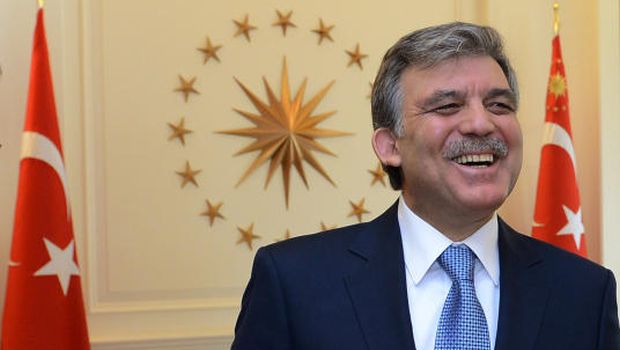
In this February 4, 2014 file photo released by the Turkish Presidency Press Office, Turkish President Abdullah Gül smiles in his office in Ankara, Turkey. (AP Photo/Ayhan Arfat, Turkish Presidency Press Office, File)
London, Asharq Al-Awsat—Turkish President Abdullah Gül said on Monday that journalists and media figures should “revolt when necessary” to protect press freedoms—a day before signing controversial new legislation tightening government control over the Internet in Turkey.
Responding to criticism of Ankara’s escalating media crackdown, Gül told a press conference on an official visit to the Hungarian capital of Budapest: “Everyone must protect their business. They must stand by what they believe in. They must do this regardless of what others say. There may be some experiences [of government intrusion], but media outlets should do what they think is correct.”
Gül signed the bill imposing extra controls on Internet use into law on Tuesday before Tweeting that he had approved it. Approximately 80,000 Twitter users immediately “unfollowed” him in protest, according to reports. The Turkish president, a well-known user of social media, still has approximately 4.3 million followers.
The controversial legislation allows the Turkish government to block access to websites without obtaining a court order, among other measures. Gül said he agreed to sign the bill because the government promised to alter two articles he found excessive.
Responding to a question on whether he intended to warn Prime Minister Recep Tayyip Erdoğan against intervening in the media, Gül said: “Such interference should not happen. Such a thing cannot happen. But, furthermore, broadcasting is also a public duty. You [the media] speak to millions of people. This comes with a responsibility. Members of the media should use self-control when necessary. They should warn themselves on issues of morality when necessary. They should insist on the things they consider correct when necessary. And they should revolt when necessary.”
Gül acknowledged that international concerns over Ankara’s worsening freedom of the press record were increasing. He said: “We have to correct this quickly. There is a difference between perception and facts. The perception makes it seem more dangerous [than it is]. If there are things that contribute to the perception that Turkey has little press freedoms, we should correct this.”
A report published by US media watchdog the Committee to Protect Journalists last week, said that “firings and forced resignations of journalists in Turkey at the government’s behest” were just some of the major developments in the country’s media in 2013.
“Turkey in 2013 remained the world’s leading jailer of journalists. The country continues to promote self-censorship through the widespread use of detentions and criminal prosecutions of journalists,” the report said.
“Turkey also continues to use broad anti-terror laws to criminalize critical expression and suppress the Kurdish media as well as leftist and nationalist groups,” the statement added.
The NGO Reporters Without Borders is also strongly critical of Turkey. Its 2014 World Press Freedom Index ranks Turkey 154th out of 180 countries.
Earlier this week, Habertürk newspaper Editor-in-Chief Fatih Altaylı explicitly criticized the government crackdown during a live broadcast.
He said: “Instructions are pouring down every day [on media groups] from somewhere. There is pressure on all of us. Today, the dignity of journalism is being crushed underfoot. Everybody is afraid [of losing their job].”
An audio recording of Erdoğan instructing a senior manager of the media group that owns Habertürk to cut coverage of a rival mayoral candidate was leaked on the Internet earlier this week. Erdoğan is heard complaining that Republican People’s Party Istanbul mayoral candidate Mustafa Sarıgül is receiving too much coverage.
The leaked audio recording is just the latest in a series of phone calls between the Turkish prime minister and deputy chairman of the Ciner Media Group Fatih Saraç that have entered the public domain. Previous recordings reveal Erdoğan criticizing the Habertürk newspaper and its TV channel over their positive coverage of the opposition and criticism of government policies.
